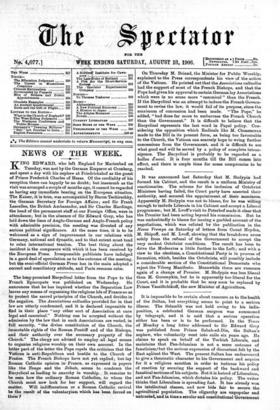The long-promised Encyclical letter from the Pope to the French
Episcopate was published on Wednesday. He announces that he has inquired whether the Separation Law leaves any means of organising the religious life of France so as to protect the sacred principles of the Church, and decides in the negative. The Associations cultuelles provided for in that law are utterly condemned, and it is declared impossible to find in their place "any other sort of Association at once legal and canonical." Nothing can be accepted without the admission by the law that in such Associations are vested, in full security, "the divine constitution of the Church, the immutable rights of the Roman Pontiff and of the Bishops, and their authority over the necessary property of the Church." The clergy are advised to employ all legal means to organise religious worship on their own account. In the latter part of the letter the Pope repels the criticism that the Vatican is anti-Republican and hostile to the Church of France. The French Bishops have not yet replied ; but lay Roman Catholic opinion in. France, as expressed in papers like the Temps and the Debate, seems to condemn the Encyclical as leading to anarchy in worship. It remains to be seen how the ordinary Roman Catholics, to whom the Church must now look for her support, will regard the matter. Will indifferentism or a Roman Catholic revival be the result of the voluntaryism which has been forced on thorn ? On Thursday M. Briand, the Minister for Public Worship, explained to the Press correspondents his view of the action of the Vatican. He pointed out that the Associations cultuelles had the support of most of the French Bishops, and that the Pope had given his approval to certain German lay Associations which were in no sense more "canonical" than the French. If the Encyclical was an attempt to induce the French Govern- ment to revise the law, it would fail of its purpose, since the maximum of concession had been made. " The Pope," he added, " had done far more to embarrass the French Church than the Government." It is difficult to believe that the Encyclical represents the last word in Papal policy. Con- sidering the opposition which Radicals like M. Clemenceau made to the Bill in its present form, as being too favourable to the Church, the Vatican can scarcely hope to wring further concessions from the Government, and it is difficult to see what good end will be served by a policy of complete intran- sigence. The Encyclical is probably to be regarded as a ballon cressai. It is four months till the Bill comes into effect, and there is ample time for some compromise to be reached.


































